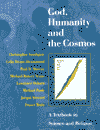Religion as Evolutionary PhenomenonIs religion merely an evolutionary
strategy? It is easy to concede the point made years ago by D.T.Campbell But the belief that religion is also able to anticipate future possibilities to which cultural evolution has not yet attained, because it represents a process of adaptation to the-way-things-really-are, is a much more contentious one. It will be held inside believing communities, but will be largely opaque to those outside. A significant study which sees religion as
an evolved phenomenon is Gerd Theissen’s Biblical
Faith: An Evolutionary Approach Within such a scheme, a religious or scientific explanation is only more or less successful than its competitors. But when he reaches the climax of his
description of the evolution of Hebrew religion, Theissen cannot forbear to
speak of ‘the discovery of the one
and only God’ (emphasis ours) Theissen’s difficulties with terminology reflect the fact that the evaluation of scientific descriptions of religion as an evolved phenomenon will necessarily depend on the religious position of the evaluator. For further discussion see can reductionism rule out the truth of religion? Or consult a critique of Willem B Drees’ typology. To explore the character of the two types of enquiry see critical realism in science and religion.
Email
link | Feedback | Contributed by: Dr. Christopher Southgate
|






